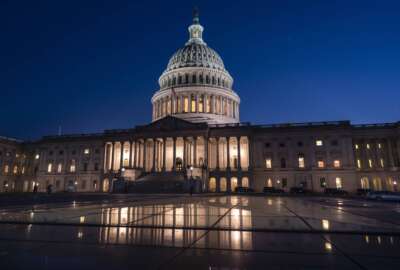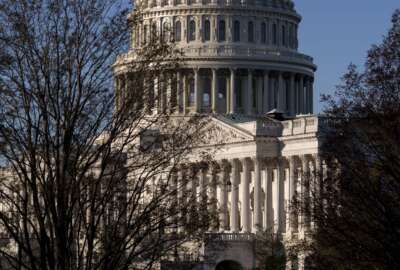Both the House and Senate have a lot to take care of and not that much time to do it
Coming back from its holiday recess, both chambers of Congress have a lot of business to take care of before their next one.
Coming back from its holiday recess, both chambers of Congress have a lot of business to take care of before their next one. With nominations and appropriations on the agenda, Federal Drive with Tom Temin spoke with Bloomberg Government’s Loren Duggan, to get all the details.
Interview Transcript:
Loren Duggan So we’re entering a three-week stretch before the August recess, where Congress has a lot to do to make progress on some expiring provisions. One this month, some in September and some by the end of the year. So this is going to be a crunch time for both House Republicans and Senate Democrats to get their agenda through their respective chambers. The big thing this week is going to be on the House side, the defense policy bill, which is always a key piece of legislation every year. And that’s probably what’s going to dominate that side of Capitol Hill this week as they go through that massive piece of legislation.
Eric White Yeah. What are some of the ins and outs of negotiating going on there? The bill itself was bipartisan coming out of the House Armed Services Committee. But what are they trying to figure out the nitty gritty details of?
Loren Duggan Right. So the final vote in the committee was, as you said, very bipartisan, only one no vote that I think masks some of the disagreements between the Republicans and Democrats on some of the finer points of that legislation. And as we’ll see this week, more than 1400 amendments were filed to be considered. Not all of those are going to make the cut, but some of the ones that have been proposed so far could be flashpoints between the parties, everything from Ukraine aid to DoD and abortion policy and what to do about diversity, equity and inclusion or DEI programs that have been kind of a flashpoint in spending bills and in this authorization bill as well. So I think as that bill hits the floor and people talk about the provisions that are already in the bill, some things like curtailing some DEI policies and then maybe other policies they want to see added that’s going to be potentially a heated debate. And they still have to get a majority from Republicans and Democrats to get that bill through and to get each of those amendments through. So there might be some complicated math as they figure that out. In terms of the broadest picture of the bill, the $886 billion or so that it would authorize, there’s agreement there between the House and the Senate on that top line. So that might make a final bill a little bit easier. They’re not arguing as much anymore about the defense side of the budget, but as we’ve seen, non-defense spending is still going to be a flashpoint. But this bill has so many provisions in it, so many pages, and is attractive for other issues, even if they’re not directly related to defense, that it’s going to be a key thing to watch this week as that plays out.
Eric White Yeah, particularly the Pentagon abortion policy. We’ve already seen that issue have a ripple effect in other areas when it came to congressional defense responsibilities. Are they going to be able to get past that? Because it’s been a real sticking point.
Loren Duggan It has. And in the Senate, I think you’re referring to Tommy Tuberville, who’s the Alabama Republican senator, former football coach, who has been holding up most DoD nominees while this is playing out with the abortion policy at DoD. So he’s he can’t hold them up forever. But the steps that Senate Democratic leaders would have to take to overcome his holds, as it were, on each DoD nominee would take a considerable amount of time. A big nomination they have to deal with is the chairman of the Joint Chiefs of Staff. President Biden set up a nominee. There’s going to be hearings this week. I would assume that they’re going to try to push that through as fast as possible. They may even be willing to take the lengthy floor time to process that nomination. But there are a couple of hundred that needs to be dealt with that are just languishing right now as long as there’s not an agreement to move them faster so that it’s still going to play out over the coming weeks.
Eric White Speaking of Senate nominations, as you mentioned, there are plenty to go about. What is on the schedule for next week?
Loren Duggan The first vote we’ll see is on Xochitl Torres Small to be the deputy secretary of USDA. She’s a former House member, is already at USDA. This would be kind of a higher level job for her. That’s the first big vote. And then we’ll see some others for the head of the Violence Against Women Office and then some more judicial nominees on the Senate floor. In the committees, there’s going to be a markup on some FCC nominees. So more action there. And then the one that’s been in the background and there’s a lot of questions going into this work period, is Julie Su to lead the Labor Department. That nomination has not been solidified yet because there’s questions about some of the Democratic support. With a 51-49 split, they can only afford to lose so many Democrats to imperil a nominee. So we’ll be checking again with senators when they’re back in town to see what they want to do on that nomination. But it’s been a tricky one, to say the least, at getting her through.
Eric White What can you tell me about the Violence Against Women office, since that was President Biden’s landmark legislation when he was in the Senate? And it’s usually been a pretty bipartisan issue. I imagine the pick forward to run it is probably not as controversial as others.
Loren Duggan It might not be. But sometimes what happens here is that just processing nominations can take time. If any senator has an objection that can require them to jump through the steps of filing for cloture and then taking the days and the time to get that through. So I’m not 100% clear on the particulars there, but this is one that couldn’t sail through on a voice vote or unanimous consent. So they’re just going through these steps, but often you don’t schedule a vote in the Senate unless you think you can win it, which is one reason I think that they’ve held off on this. For example, Julie Su they haven’t been sure they could win that one, but we’ll see if that one can clear that hurdle this week in the Senate.
Eric White We’re speaking with Loren Duggan from Bloomberg Government. And are there any other major appropriations or even minor appropriations. Whenever you’re talking about appropriations, it’s usually big dollar figures, but minor in the scope of government spending that are on the House and Senate docket.
Loren Duggan Not yet to the floor. There’s been a good amount of committee activity so far with at least a half dozen or so through the House Appropriations Committee, more through subcommittee, and than we saw to get through the Senate panel before they went on this two week recess that they’re going to pick up with that again this week, try to process as many as they can. We’re seeing so far as that divergence, as I mentioned, with the House still looking to bring down non-defense discretionary spending to fiscal 22 level. So a cut given that there was a bump up going to 23 and then the Senate pretty much sticking to the spending caps that they agreed upon with that debt limit deal that we saw with a flurry of activity earlier this year. So that’s one divergence point. The other is going to be what riders do you attach to this? As I mentioned, DEI issues have come up a lot in the House so far. Also, critical race theory and trying to prevent government funding from being used for that. That language has been in the House bill, not so much in the Senate bill, but as they get to more of these bills, we’ll see if the rider language gets more complicated there as well. But September 30th, not that far away, not a lot of work weeks left before that. So right now they’re talking about full year bills and all the line items. But at C.R. talks, or continuing resolution discussions may not start in July, but that’s always going to be in the back of people’s minds. How quickly are they going to have to turn to that and make sure that they can keep the government open after September 30th.
Eric White Let’s talk about an issue that’s probably near and dear to a lot of politicians hearts, since many of them are fans or play it. What is this I’m hearing about a PGA tour, Live Golf deal hearing? And how much of this is just politicians hoping they can meet some of their favorite golfers?
Loren Duggan I don’t think there’s going to be golfers at this hearing, but the obviously, it was blockbuster news when the PGA Tour and Live Golf, which is backed by a Saudi investment firm and Saudi investment company, I believe it is announced that they were going to have a deal to come together under one umbrella organization along with, I think, the European tour. There’s a lot of interest in this because it’s foreign money and foreign investment in an American product. Some concerns about that, obviously, among lawmakers who want to know more about it. So we’re going to hear from people who were involved in the deal making more than golfers right now. But I think this is the first of many hearings we’re going to see. This is in the Senate Homeland Security Committee. I could see the House doing something on this as well, because it obviously provoked a lot of reaction from folks. But sports sometimes come to Capitol Hill and you get that interesting cross-section. And that’s what we’ll be seeing, at least in that hearing.
Eric White Yeah, And it’s all just about the Saudi money in there. There’s no I know that sports kind of has a little niche carved out where they aren’t liable to antitrust regulations. But is that among the concern as well?
Loren Duggan I mean, I could see that coming up because you have all these differing tours coming together under one umbrella. I’m sure that might be one of the things they bring up. And sometimes that’s why Congress pulls them in because of antitrust exemptions. That’s why you can get them in front of you to talk about these things. So like I said, not the first sports hearing we’ve seen on Capitol Hill and undoubtedly not the last, but a big issue for sure. And I guess we’ll see more ESPN in sports as people kicking around the hill than usual when that one’s happening.
Copyright © 2024 Federal News Network. All rights reserved. This website is not intended for users located within the European Economic Area.
Tom Temin is host of the Federal Drive and has been providing insight on federal technology and management issues for more than 30 years.
Follow @tteminWFED






